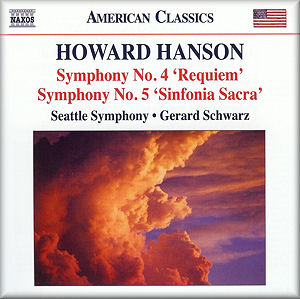 |
 |
|


alternatively
CD: MDT
AmazonUK
AmazonUS
Sound
Samples & Downloads |
Howard HANSON (1896-1981)
Symphony No. 4, Op. 34, Requiem (1943) [25:45]
Symphony No. 5, Sinfonia sacra, Op. 43 (1954) [15:10]
Elegy in Memory of Serge Koussevitzky (1956) [12:43]
Dies Natalis (1967) [16:07]
 Seattle Symphony Orchestra/Gerard Schwarz
Seattle Symphony Orchestra/Gerard Schwarz
rec. 16, 18 February 1990 (No. 4), 18-19 May 1992 (No. 5), 5 January
1988 (Elegy), 6-7 June 1994 (Dies Natalis), Seattle Opera House,
Seattle, USA
 NAXOS AMERICAN CLASSICS 8.559703 [69:45]
NAXOS AMERICAN CLASSICS 8.559703 [69:45]
|
|
|
One of the cannier decisions made by Naxos was to repackage
and reissue these Delos releases. As a very recent convert to
the music of Howard Hanson I warmly welcomed this team’s recording
of the Nordic symphony and Lament for Beowulf
– review
– the unexpected pleasures of which made me determined to hear
this entire cycle. I was struck by the freshness and vitality
of those pieces and, even more so, by the warmth and humanity
of Schwarz’s readings. I’ve yet to hear Hanson’s recordings
of his own works – so well received by RB – but they would have
to be very special indeed to rival this Seattle series (review).
As its subtitle suggests the Fourth Symphony is cast in four
familiar sections – Kyrie, Requiescat, Dies
irae and Lux aeterna. There’s certainly a prayerful
quality to the first, which has a luminosity and loveliness
of line that’s most apt. Indeed, one could almost imagine a
choir offering its supplications, to which the orchestra responds
with firmness and clarity. The recording is very detailed, the
delicate pizzicati at the start of the Requiescat
well caught and instrumental colours beautifully rendered. But
it’s the Schwarz’s sure sense of mood and scale that impresses
most, inwardness matched with elegance.
This really is heartfelt music, persuasively played. Even the
traditionally apocalyptic Dies irae has an air of restraint,
building to a strong but entirely proportionate climax. Balance
and good taste are the touchstones here, and Schwarz never loses
sight of that, the rapt Lux aeterna – and its efflorescing peaks
– most movingly done. The final bars may be understated but
gain added poignancy from being so. A gentle and benevolent
work, it’s easy to see why it was the composer’s favourite.
And even though it has more sinew, the Passion-inspired Fifth
is blessed with the same virtues of simplicity and seamlessness;
also, there’s more than a hint of Vaughan Williams in those
flowing tunes, the whole naturally paced and incisively played.
Short but surprisingly substantial, the Fifth is joy from start
to finish.
Speaking of favourites, Hanson’s tribute to Serge Koussevitzky
– who commissioned and premiered so much important music, including
the composer’s own – is the piece I admire most here. Those
mourning strings and glowing harmonies are deeply affecting,
a blend of piercing desolation and indomitable strength. Indeed,
it’s a score whose emotional reach far exceeds its deceptively
simple means. A treasurable work, and one I can’t imagine more
sympathetically played than it is here.
The final piece, Dies Natalis, is made up of an introduction
and Lutheran chorale, a set of variations and a finale. It’s
also a commemoration of the centenary of the state of Nebraska,
the latter evoked in music whose sweeping vistas bring to mind
the soundscapes of Aaron Copland. That said, Hanson may speak
in predominantly quiet tones, yet it’s the underlying nobility
and passion of his oratory that catches the ear and grip the
heart. Schwarz, who responds so intuitively to these stirring
cadences – echoes of Lincoln, perhaps – fashions a finale of
simple but compelling grandeur. Another splendid composition,
and a spur to seek out more of Hanson’s generous, open-hearted
œuvre.
Not only are these fine performance they’re also superbly recorded
– well balanced and tonally refined – making them a mandatory
purchase for anyone with even a passing interest in American
music.
Works of strength and subtlety, supremely well played.
Dan Morgan
http://twitter.com/mahlerei
|
|















